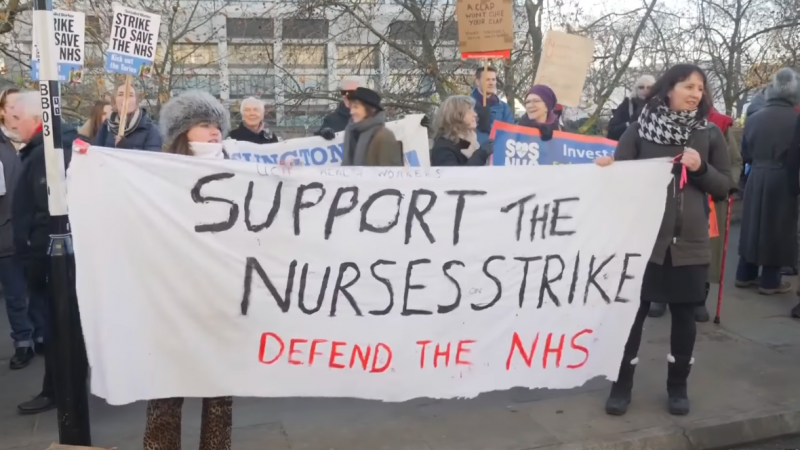Nurses in England are being left behind in pay disputes as Westminster refuses to negotiate.

England’s nurses are being ‘punished’ by this government.
This was the claim made by Pat Cullen, General Secretary of the Royal College of Nursing (RCN), as a government stalemate has forced nurses in England to continue their strike action this week.
It comes as strikes also scheduled to take place on the 6th and 7th February in Wales were called off after the Welsh government joined Scotland in presenting a pay offer for the current financial year.
However, despite the RCN’s ongoing calls to join them at the negotiation table, Rishi Sunak and his government have failed to do so, and therefore failed to put a stop to the strikes.
As a result, nurses in England continue to lose pay with each strike day that goes by without the government presenting a resolution.
Following negotiations with unions, the Welsh government has offered a 3 per cent pay rise for the year 2022/23, which will be put to a vote of RCN members.
In Scotland, strikes were paused following a proposal of an additional payment for the year 2022/23 and accelerated negotiations over a 2023/24 pay increase, which are ongoing.
This leaves Westminster as the only government unwilling to negotiate to stop the strikes taking place, despite nurses offering to call off strikes if Sunak matches the Welsh pay offer.
Their failure to do so has led to the biggest strike in the history of the NHS, as Cullen told Sky News that the government and Rishi Sunak have ‘turned their back on nurses.’
She said: “If you look at what’s happened across England and compare it to Scotland and Wales, where both governments have got to the table and started to negotiate, it can only be described that the nurses in England are being punished and left behind by Rishi Sunak and this government.
“The RCN has said all along that once they get to a negotiating table and an offer is put to their members, they would immediately call off any strikes and consult with their members.
“This is what has happened in Wales and Scotland. But we can’t get that to happen in England because this PM will not come to the table.”
With neighbouring government’s able to find more money to bring to the negotiating table, it questions the Prime Minister’s unwillingness to do the same, contradicting the government’s argument that there is simply not enough money.
An argument also undermined by research that has proven the affordability and benefits of offering an NHS pay rise.
A report by London Economics in 2021 concluding that, not only are pay rises in the NHS much needed and overdue, they are also affordable and would support the wider economy.
The research, commissioned by RCN, found that a pay rise of 10% to NHS support staff would have only come to 0.075% of total government expenditure in 2019-20, due to offset from taxation and improved staff retention.
The salary of an experienced nurse in England, Wales and Northern Ireland has fallen in real terms by 20% and 16% in Scotland.
But the government in England has continued to hide behind the recommendations of the ‘independent’ NHS Pay Review Body (PRB) in their refusal to budge on a pay offer.
However the independence of the PRBs has been called into question as the Trade Union Congress said they can’t act fully independently as the government sets the upper limits of what they can recommend.
Amid NHS pay disputes in January, Unite General Secretary Sharon Graham asked why, as the fifth richest country in the world, does this government have a problem about paying.
She claimed that behind the government’s refusal to negotiate a settlement on the NHS pay dispute is a more sinister aim to privatise the health service.
“There is something unusual going on here, that they will not come to the table”, she told Sky News. “I think they are looking to privatise the NHS.”
“Otherwise they are at a level of incompetence not known.”
NHS staff have also continued to raise the alarm over unsafe working conditions and risks to patient safety within the health system due to underfunding and a staff shortage crisis, with 47,000 current nursing vacancies in England.
In a dispute that is not just about pay but about the serious issues affecting the health care system, ministers are being urged more than ever to put public health before politics.
Arguably the inability of the government to come to the negotiating table will only enhance nurses’ willingness to take industrial action, if they are left behind as the lowest paid in the UK.
Hannah Davenport is trade union reporter at Left Foot Forward
(Photo credit: Sky News / YouTube)
Left Foot Forward’s trade union reporting is supported by the Barry Amiel and Norman Melburn Trust
To reach hundreds of thousands of new readers we need to grow our donor base substantially.
That's why in 2024, we are seeking to generate 150 additional regular donors to support Left Foot Forward's work.
We still need another 117 people to donate to hit the target. You can help. Donate today.



